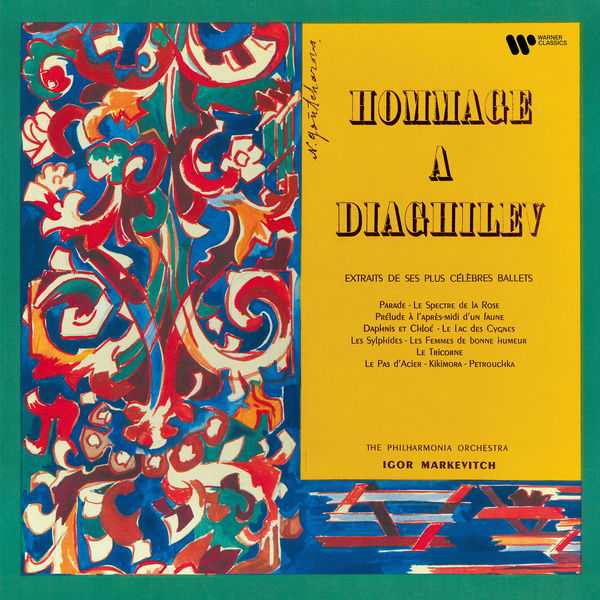
Composer: Frédéric François Chopin, Claude Achille Debussy, Manuel de Falla, Anatol Liadov, Sergei Prokofiev, Maurice Ravel, Erik Alfred Leslie Satie, Igor Stravinsky, Pyotr Il’yich Tchaikovsky, Carl Maria von Weber
Orchestra: Philharmonia Orchestra
Conductor: Igor Markevitch
Format: FLAC (tracks)
Label: Warner
Catalogue: 9029641943
Release: 2022
Size: 402 MB
Recovery: +3%
Scan: cover
Satie: Parade
01. Choral
02. Prélude du rideau rouge
03. Prestidigitateur chinois
04. Petite fille américaine
05. Acrobates
06. Final – Suite au Prélude du rideau rouge
07. Weber: Weber / Orch. Berlioz: Invitation to the Dance, Op. 65, J. 260
08. Debussy: Prélude à l’après-midi d’un faune, CD 87, L. 86
Ravel: Suite No. 2 from Daphnis et Chloé, M. 57
09. I. Lever du jour
10. II. Pantomime
11. III. Danse générale
Tchaikovsky: Swan Lake, Op. 20, Act 2
12. No. 10, Scene. Moderato
13. No. 11, Scene. Allegro moderato – Moderato – Allegro vivo
Tchaikovsky: Swan Lake, Op. 20, Act 1
14. No. 5b, Pas de deux for Two Merry-Makers. Andante – Allegro
15. No. 5c, Pas de deux for Two Merry-Makers. Tempo di valse
16. No. 5d, Pas de deux for Two Merry-Makers. Coda
17. Tchaikovsky: Swan Lake, Op. 20, Act 3: No. 19c, Pas de six. Variation II
18. Tchaikovsky: Swan Lake, Op. 20, Act 1: No. 8, Dance with Goblets
19. Tchaikovsky: Swan Lake, Op. 20, Act 2: No. 13g, Dances of the Swans. Coda
20. Chopin: Chopin / Orch. Douglas: Les sylphides: Mazurka, Op. 33 No. 2
Scarlatti, Tommasini: Suite from The Good-Humoured Ladies
21. I. Presto
22. II. Allegro
23. III. Andante
24. IV. Non presto, in tempo di ballo
25. V. Presto “Cat’s Fugue” – Finale
Falla: Suite No. 2 from El sombrero de tres picos
26. II. Danza del molinero. Farruca
Prokofiev: Le pas d’acier, Op. 41, Tableau I
27. Entrée des personnages
28. Train des paysans-ravitailleurs
29. Les commissaires
30. Les petits camelots
31. L’orateur
32. Matelot à bracelets et ouvrière
33. Le matelot devient un ouvrier
Prokofiev: Le pas d’acier, Op. 41, Tableau II
34. L’usine
35. Les marteaux
36. Finale
37. Liadov: Liadov: Kikimora, Op. 63
Stravinsky: Three Movements from Petrushka
38. I. Russian Dance (Orchestral Version)
39. II. Petrushka’s Cell (Orchestral Version)
40. III. The Shrovetide Fair (Orchestral Version)
“Hommage à Diaghilev – Igor Markevitch”
Released in addition to the “Diaghilev: Ballets russes” 22CD boxset, this 3LP set is the reissue of the 1954 box initiated by Walter Legge, EMI’s famous producer, to commemorate the 25th anniversary of Diaghilev’s death. The cover reproduces the original illustration purposely designed at the time by Natalia Goncharova, one of the famous set painters of the Ballets russes. The 32-page booklet, richly illustrated with historical photos and sketches of costumes, sets…, includes the notes from the 1954 edition, in English and French, by Igor Markevitch along with a short excerpt of ‘Le Ballet’ by Boris Kochno, and work presentations by the British dance specialist Cyril W. Beaumont.
Serge Diaghilev (1872-1929): the impresario who changed musical history
31st March 2022 marks the 150th anniversary of the flamboyant, visionary and influential impresario Serge Diaghilev, founder of the legendary Ballets russes. In 1906 he promoted Russian art and sculpture at the Salon d’automne in Paris, which in the early 20th century was the world’s capital of culture. He continued to be active in Paris: the following year he mounted concerts with such Russian artists as the composers Rimsky-Korsakov, Rachmaninov and Glazunov, and the singers Feodor Chaliapin and Félia Litvinne. In 1908, at the Paris Opéra, he staged Mussorgsky’s opera Boris Godunov with Chaliapin. The designs were by two Russian artists – Leon Bakst and Alexandre Benois – who became closely associated with the Ballets russes company, which Diaghilev founded in Paris in 1909. For two decades, in a period of rich cultural ferment, dramatic transition and geo-political upheaval, the Ballets russes created a sensation with its innovative fusion of dance, music and design. In 1929, when the company disbanded following Diaghilev’s death, it had played a crucial role in the evolution of the performing and visual arts.
The composer and conductor Igor Markevitch met Diaghilev at the Paris Opera in December 1928, when he was only sixteen. Diaghilev always on the lookout for new ballet music thought he had found a composer who could give him a score for the next season of the Ballets russes. He commissioned a piano concerto from Markevitch as a test piece, which was premiered by the composer at the piano and conducted by Roger Désormière in London on 15 July 1929 and was a great success. Diaghilev’s unexpected death a month after left the next planned work unfinished. Markevitch was greatly impressed and influenced by Diaghilev and retained a great admiration for him.